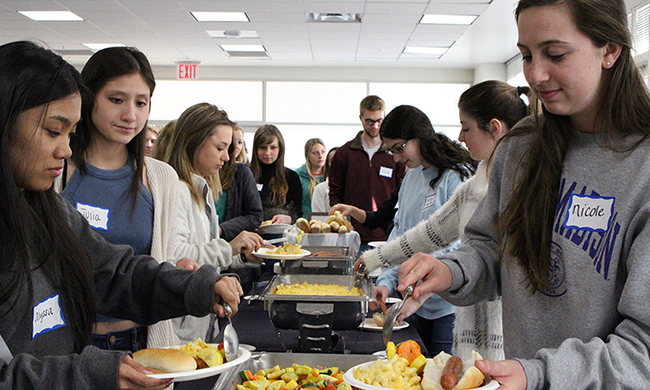Department of Health Sciences committee hosts hunger banquet
Participants in the Hunger Banquet experienced differing levels of food quality and quantity
NewsSUMMARY: The Interprofessional Education Committee of Health Sciences hosted their first Hunger Banquet on March 21st.
By: Lauren Mitchell '19
Creative Services

All of us have seen the images of children in third-world countries with distended stomachs suffering from hunger. We are encouraged to donate money, food and water to help end world hunger. However, this issue of starvation does not only exist in underdeveloped countries. In fact, it is present right here in our backyard. The Blue Ridge Area Food Bank serves an average of 118,600 people per month, which ends up totaling about 20.6 million meals a year. In order to raise awareness about this local and worldwide problem, the Interprofessional Education Committee of Health Sciences hosted their first Hunger Banquet on March 21st.
The goal was to inform the students about the topic of hunger and to encourage them to go out and be advocates for combatting it. While most Hunger Banquets stop there, this one went one step further by adding a focus to prepare future health professionals who may encounter patients suffering from hunger. The event examined how hunger will affect the professional lives of the dietitians, occupational therapists, physician’s assistants, and other health professionals. While it was open to all students, this Hunger Banquet was geared towards students in the Health Sciences department. “At the beginning of the event, many students did not realize how hunger could affect them professionally. When the groups reconvened at the end, all of the students understood their responsibility in treating hunger,” Christie Briskey, a graduate occupational therapy student and facilitator of the event, explained. Dr. Michelle Hesse explained that it is important to be knowledgeable about hunger so that when you come across a case in your professional life, you can be more understanding of the situation.
The event simulated the income differences and the prevalence of hunger in America. The participants were broken up into income groups, either high-income, middle-income, or low-income. The amount of people in each group was based off the percentage of people actually living in these income groups in America. Each group had completely different dining experiences with varying quantities and qualities of food, eating environments, and nutritional values. Through these dining experiences, students got a glimpse into the daily lives of those in the various income groups. “The goal of this event was to raise awareness about hunger. We hope that the students reflected on their meal and how they felt during the dining experience and realize that this really is how some people live,” explained Dr. Margi Stickney, another faculty member involved in the planning of the banquet. Blue Ridge Area Food Bank CEO Michael McKee also presented at the event to share how hunger affects the surrounding area. At the end of the meal, students were broken up into small groups and encouraged to discuss their feelings about the experience and learn through the perspective of others. Briskey explained that these groups got the opportunity to dive deeper into the topic and how it will affect them in their professional lives. “There were a lot of different disciplines represented at the Hunger Banquet and in the smaller groups so it was truly a team effort,” she said.
A lot of work went into the Hunger Banquet in order to make it the meaningful event that it became. The Health Sciences Department encompasses 8 disciplines, and a faculty member from each area worked to create an interdisciplinary event. JMU dining services and Aramark catered for the banquet.
“The event was really informative and showed the severity of hunger not just in the world, but in our area as well,” Briskey described. The goal to make those who attended the Hunger Banquet feel engaged in the Harrisonburg community and feel empathetic towards the issue was accomplished, which is the first step in combatting world hunger.

